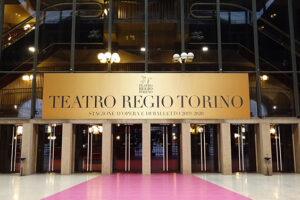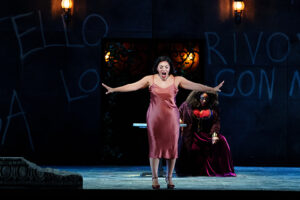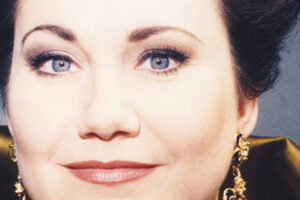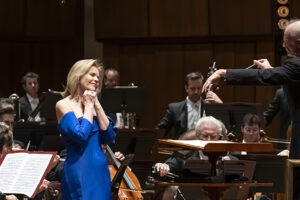
Handel’s 1711 opera Rinaldo was the first Italian opera ever written specifically for the London stage. It therefore seems fitting that Glyndebourne would mount a major revival of the piece to celebrate its 300th anniversary. Believed to be largely composed of previously written pieces from Handel’s 1706-10 Italian visit, Rinaldo has no “standard edition,” as the composer himself made transpositions, cuts, and additions in order to suit the available voices.
Still, it has fared well during the baroque revival of the late 20th century, and it’s title role has lured great voices from the castrato Nicolini to the great mezzo Marilyn Horne, who made it one of her signature roles in the 1980s at the Met and elsewhere.
Glyndebourne’s 2011 revival took the Handel/Rossi story of heroism and romance in the First Crusade and placed it in the hands of director Robert Carsen. On this DVD, he has completely re-imagined the setting and the story, with Rinaldo himself as a bullied schoolboy and the entire piece as the boy’s dream of romance and of himself as the hero he would never really be.
Designer Gideon Davy has created various school-related settings including a classroom, a “playground area” with chain-link fence and bike rack, and a gymnasium. The object of Rinaldo’s affections, Almerina, is an innocent schoolgirl who sings her little songs to the birds. The Saracen enemy leader Argante enters with chador-covered women carrying urns of tea; when Armida his consort enters, the women throw off their chadors and are discovered to be “mean girls” who will serve as the Furies. Armida herself is a vinyl-clad dominatrix.
Let it be said that Carsen’s conception is admirably consistent with the story; there are no jarring moments when the music or the drama seems out of place with the modernization. But, unfortunately, it also removes all vestiges of seriousness from the piece. Never do the Christian-Saracen conflicts of the Crusades have any stakes; we know it’s all just make-believe.
The passionate romance of Rinaldo, Almerina, and Armida is reduced to teenage angst. It also makes this the funniest Rinaldo imaginable, with lots of rather cheap “bits” interrupting any weight the drama might have generated. It is an entertaining and (too) clever Rinaldo, but there are far too few memorable moments, and, while the singing is generally admirable, there are no thrills to be had here. This is far too much cartoon and not enough drama.
Sonia Prina is an affecting and unusually touching Rinaldo, and seems to adapt herself well to the “schoolboy” concept. She makes a fine transformation from the lonely boy of the beginning to the swaggering hero of the Christians. I would have wished, however, that her voice had more colors. While she easily produces all the notes, the sound is rather generic and isn’t expressive enough, particularly in the extended laments that end Act One. Neither does she bring enough power to the heroic moments. Hard to do, I expect, when one is playing a boy pretending to be heroic.
The finest singing on this DVD comes from bass-baritone Luca Pisaroni as Argante. From his first entrance aria through his duets with Armida (Brenda Rae), Pisaroni sings with style, power, and flexibility. His is the only performance here that never seems to be “winking at the audience”—he brings a sense of truth to the character that is sorely lacking in this production.
Ms. Rae makes a stunning entrance with her frenzied aria “Furie terribili!” but later is trapped by the production into cartoon-evil antics like twisting the head off of birds and too much S&M-liker leering. Anett Fritsch brings a dewy innocence to Almirena and sings brightly, but again, when we know that she’s not in any real danger, it’s difficult to feel for her situation. Her great second act aria “Lascia ch’io pianga,” to this reviewer one of the greatest of Handel’s works, is lovely but lacks passion.
Commendations go to the chocolaty mezzo/contralto of Varhudi Abrahamyan as the Crusader’s leader Goffredo as well as the very light counter-tenor of Tim Mead as her brother Eustazio. The Christian Magus is played farcically by William Towers.
There is very fine playing throughout by the Orchestra of the Age of Enlightenment under the enthusiastic baton of Ottavio Dantone. Maestro Dantone has a lovely sense of the subtle colors and shadings of this music, and manages to make perfect transitions between martial battle music and quiet, personal songs of love and sadness.
All in all, Carsen has created an idiosyncratic and interesting “take” on Rinaldo, and the audience for this August 2011 performance seems thoroughly entertained. Still, it is more sentimental than moving, and occasionally seems to be making fun of the opera rather than illuminating it. I must confess that I kept thinking how appropriate this production might be for the “It Gets Better” anti-bullying campaign.

























Comments